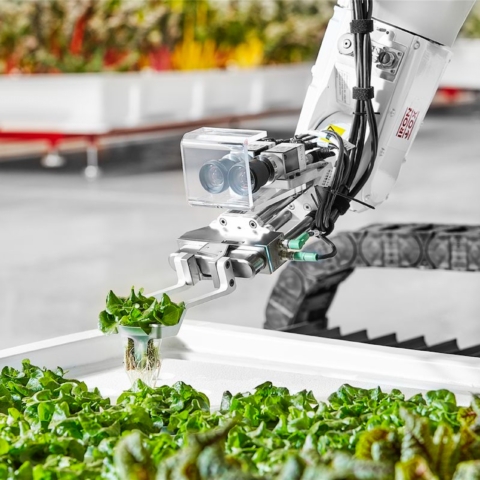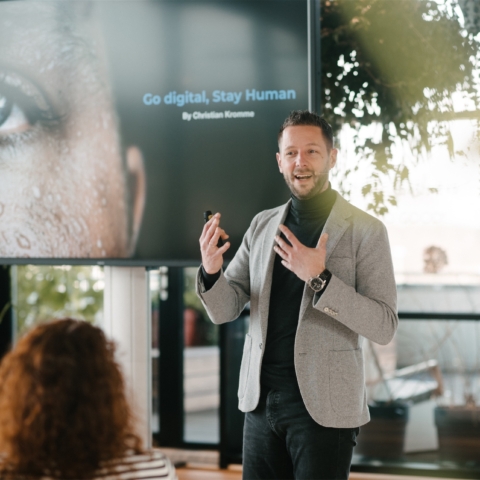Would you like to get notifications from Christian?
The future of work is a hot topic these days. With the rise of disruptive technologies, many people are worried about the impact they will have on our jobs. However, I believe that there is no need to worry. While automation may destroy some jobs, it will also create new ones that are much more focused on our human qualities. I see a bright future for work, I believe that disruptive technologies will lead to a rise in human qualities. So we need to focus on soft human skills to stay relevant in the economy of tomorrow.
Customers

Some experts estimate that between 78 % and 86 % of the jobs in our current economy are based on hard skills. The harsh reality is that the human body is actually not very well equipped to perform them for long periods of time without significant strain. The most valuable skills that take people years to learn also involve us making a lot of (expensive) mistakes during the learning process. Those skills aren't easily interchangeable either, making us somewhat inflexible.
Everything that can be digitized and automated will be – and that's going to lead to a dramatic decrease in value. Future technology will be cheap, efficient, and extremely fast at automating repetitive and routine tasks. Those tasks then become a commodity. It makes perfect sense that businesses are going to expect more and more routine tasks to be done by A.I. or by robots and I'm expecting that to happen within a decade.

Ai and robotics are going to automate a lot of tasks that don't really need human attention. This means that skills that can be digitized and automated will become less valuable, while the things that can't be automated will become more valuable. This is because businesses will be more interested in developing 'soft skills' rather than 'hard skills'.
Things like emotion, problem-solving, critical thinking, creativity, and social intelligence will be some of the most important qualities in the future workplace. So if you're thinking about your future career, focus on developing your human qualities rather than your robotic ones.

As Ai and robotics increasingly automate hard skills, we are going to be challenged to answer some serious questions about our purpose and usefulness. As our own technology makes us progressively more redundant and gives us more free time, we are going to be forced to answer some challenging questions:
Who are we, and why are we here? What does it mean to be Human? How do I lead my life and what does useful work look like in a future where many jobs have been automated? These are not easy questions to answer, but if we don't develop our thinking as fast as the tech, we will become empty vessels with very little to contribute.

The future of work is going to be about connection. In a world where we are increasingly disconnected from each other and our own true nature, I believe that the most important work will be the work that connects us back to ourselves and to each other. This includes work that helps us to understand and develop our human qualities, work that supports us in living more connected and meaningful lives, and work that helps to heal the planet.
So there you have it. The future of work is about human qualities, adaptability, and connection. If you want to stay ahead of the curve, focus on developing your soft skills and emotional intelligence. And remember, the work that will be most valuable in the future is the work that connects us to our true selves and to each other.

When you think of a keynote, what comes to mind? A dry, boring presentation that is only useful for corporate types? If so, then you are in for a surprise. Christian Kromme is a Keynote Speaker who will change your mind about keynote presentations. His keynotes are highly visual and engaging, and he can tailor his message to fit any audience.
Whether you need a keynote for a live event or something that can be viewed online or even pre-recorded, Christian has you covered. His presentations are truly inspiring and thought-provoking, and they will open your eyes to the world of tomorrow. If you are looking for a Keynote Speaker who will challenge the status quo and provide disruptive insights, then Christian Kromme is the right choice for you. Contact him today to learn more about how he can help your organization achieve its goals.
Christian is a futurist and trendwatcher who speaks about the impact of exponential technologies like AI on organizations, people, and talents. Christian tailors his presentations to your audience's specific industries and needs.



Our world is changing at an exponential rate! A big tidal wave of digital transformation and disruption is coming at us fast. Many organizations see this wave as a threat and experience stress, but there are also organizations that just see this wave as an opportunity.

Imagine sitting with just 10-15 fellow executives at a premier location, gaining clarity on the impact of AI on your industry while enjoying an exquisite dining experience. These are not just meetings—they are transformative moments that will shape the future of your organization



In the future, 3D printing and generative design will allow for products to be designed in a more decentralized manner, and production will take place closer to the customer and fully on-demand. 3D printing technology will also allow for more customization and personalization of products.


The agricultural industry is ripe for disruption. Robotics, AI, and IoT are all technologies that have the potential to radically transform the way we grow food. In combination with vertical farming, these technologies could increase the efficiency and quality of agricultural products.

A human-centered society is one that puts people first and where technology is used to unite and empower people. It is a society that values biological life and dignity above all else. It is a society that recognizes the importance of human relationships and works to strengthen them. In a human-centered society, all members of the community are valued and treated with respect.


The future of healthcare is here. New technologies like AI, IoT, big data, and smart sensors make it possible to become the CEO of your own health. Imagine that your phone can listen to your voice and AI algorithms can detect small nuances in the tone of your voice that indicate specific diseases.
